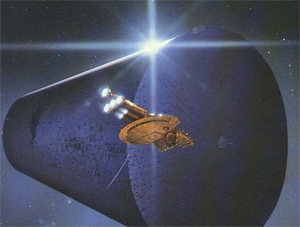
I have returned from the annual non-NASA Astrobiology conference, which I attended this year and delivered two papers. After my NASA colleague’s long-delayed paper on the discovery of microfossils in carbonaceous chondrites (meteorites that are widely believed to be extinct comet fragments) was accidentally published in March when Fox News broke the paper embargo that led to 40 million web hits, I had fond hopes that this would be the conference that broke the ice about ET. In fact, my first paper was entitled “More Evidence for Liquid Water on Comets” which recorded the mounting evidence that indeed, comets are natural bio-transporters for moving biology all over the cosmos–sorta like Arthur C. Clarke‘s novel “Rendezvous with Rama“.
Curiously, NASA has been having press conference frenzy about, you guessed it, liquid water again. First there was evidence of past water, then present water found on Mars, then briny liquid water, and soon to be fresh liquid water. Maybe, like the LCROSS impact on the Moon, it will become swimming pools of fresh water. If you recall, the reason given in 1976 for rejecting the evidence for life in Gil Levin’s “Labelled Release” experiment on the Viking Mars lander was because “everyone knows Mars is dry as a bone.” So perhaps Hoover’s paper is having the desired effect: water and gold are exchanging places in the solar system, from rarity to commodity. (If only Levin’s experiment had detected gold we’d be back there already . . . )
But the second paper was far more challenging to write. It was an answer to Stephen Hawking‘s inspired nonsense about M-theory. You can read mathematician Lennox‘s critique (here’s a review of Lennox’s book) but what you won’t get from him is any idea why Hawking, the atavar of British reserve in his 1986 best-seller “A Brief History of Time“, had become a foam-flecked mouthpiece of new atheism.